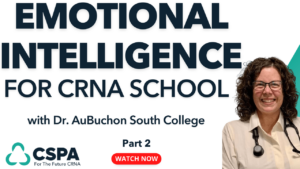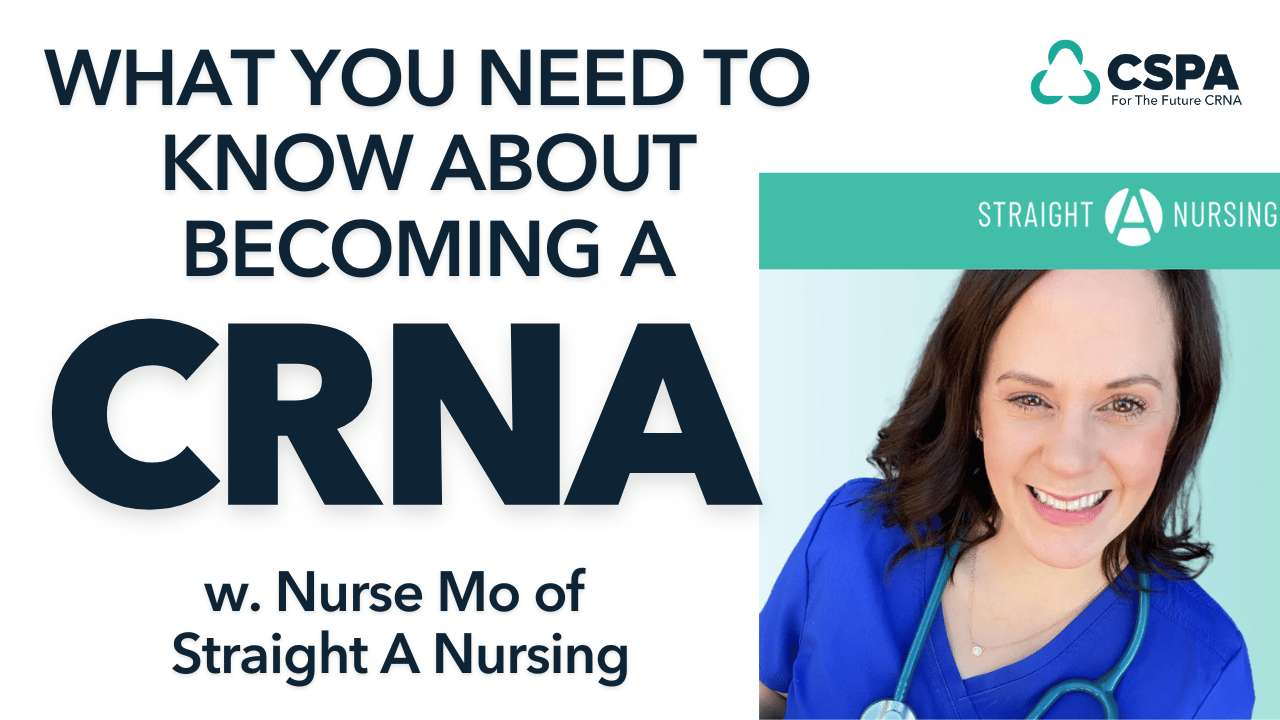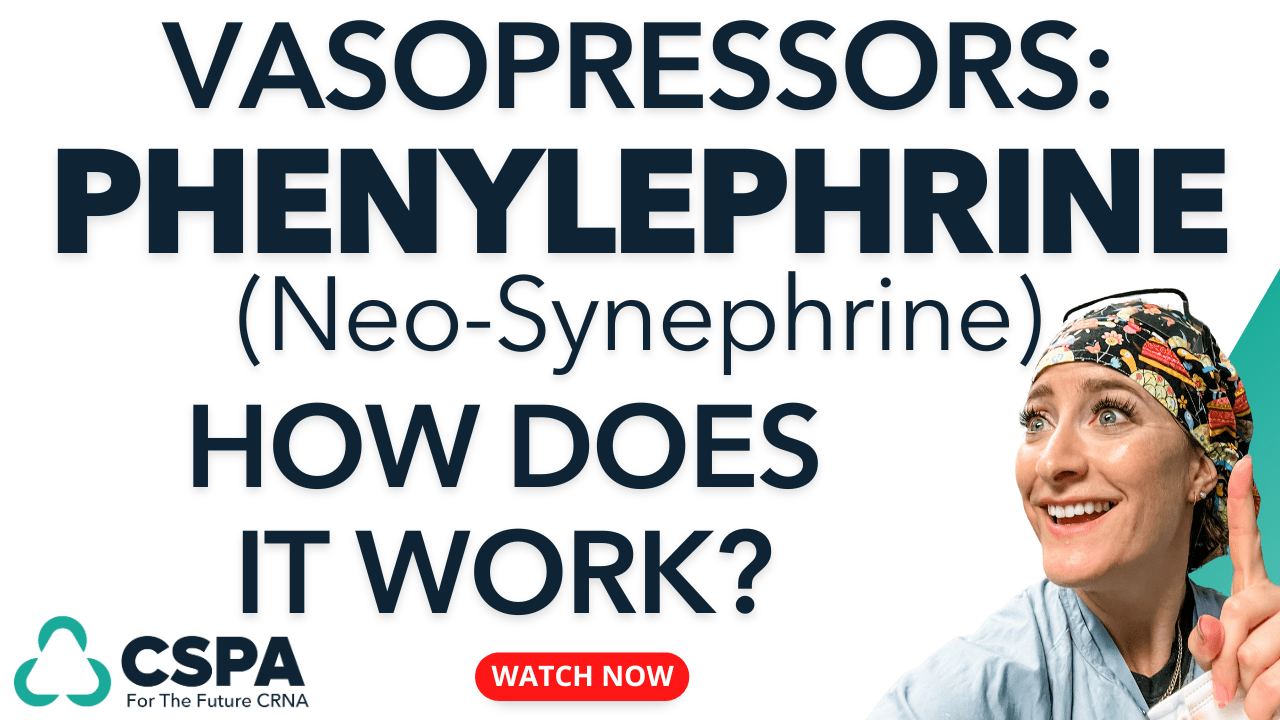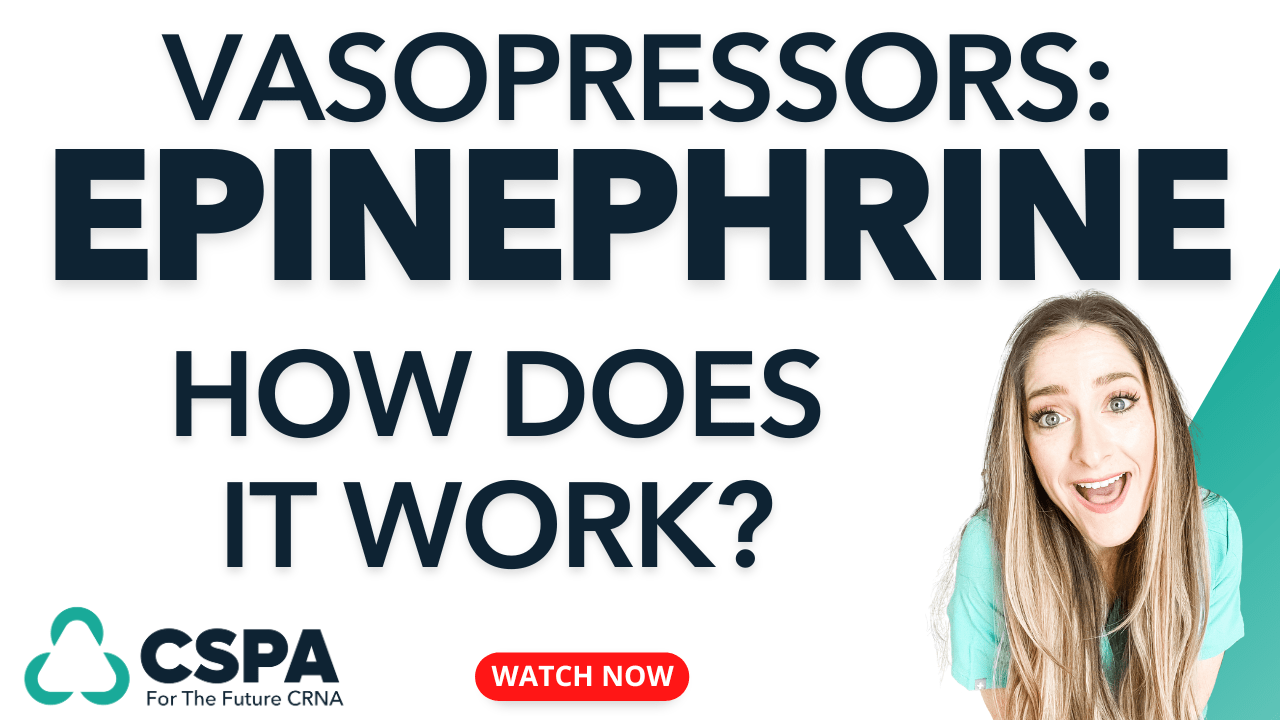
Get Your Free CRNA School Interview Prep Guide
Free CRNA School Interview Prep Guide Click Here
Dr. Dawn AuBuchon, Program Faculty at South College and CSPA Expert Contributor, joins Dr. Richard Wilson for Episode 4 of the Nurse Anesthesia Educators Unplugged Podcast, a podcast exclusively for CRNA School Prep Academy students.
Here’s a sneak peek of their discussion as they tackle the topic of Emotional Intelligence, including why it’s important and ways to develop your EI both personally and professionally.
Listen to the full episode inside CRNA School Prep Academy today!
Join CRNA School Prep Academy for Complete Access to This Episode and the Entire Nurse Anesthesia Educators: Unplugged Library PLUS ALL of the Planning & Application Tools, Interview Prep Tools and More That Have Helped Thousands Of Nurses Gain Acceptance Into CRNA School: https://www.crnaschoolprepacademy.com/join
Join the CSPA email list: https://www.cspaedu.com/podcast-email
Join the Free Facebook Community here! https://www.facebook.com/groups/crnaschoolprepacademyfree
Book a mock interview, resume or personal statement critique, transcript review and more: www.teachrn.com
—
Watch the episode here
Listen to the podcast here
Emotional Intelligence – Do I Have It? Part 2 With Dr. AuBuchon, Program Faculty At South College
I have some exciting news to share with you. We have released the Nurse Anesthesia Educators Unplugged, which is going to be your gateway to success. I want you to discover the inside scoop. I want you to be able to navigate the complexities of CRNA admissions and thrive as a candidate and a nurse anesthesia resident, which can seem like a daunting task, but what if you had a trusted guide at your fingertips? This is why we’re excited to introduce the Nurse Anesthesia Educators Unplugged, which is CSPA’s private podcast, your one-stop auditory guide to achieving your CRNA dreams.
Here are the key benefits and features of this private podcast. We will hear directly from the experts, listen to seasoned CRNA faculty members who know the admissions process inside and out, and get invaluable insights, not from the brochures or websites. You’re going to hear from behind the scenes and discover the lesser-known details of the selection process, the traits that faculty look for in candidates, and the hidden pitfalls to avoid.
Knowing that all schools are a little unique, this is going to give you that invaluable insight that’s going to allow you to see the differences between different CRNA programs and the faculty that run these programs. You’re going to hear real stories, hear from successful students who have been in your shoes, and learn about their challenges, strategies, and what made them stand out. You’re going to get strategic advice. Beyond grades, how can you learn to craft a compelling application such as for your essay or your interview responses that will resonate with the admissions teams?
You’re also going to get flexible learning. You can listen to this podcast on your commute, during your workouts, or even while cooking. We want this learning to fit your schedule. You’re going to hear a lot of Q&As on these podcasts. These questions and answers are found in our private CSPA community. We pick questions that are commonly asked by CSPA students and bring them to the table during this faculty podcast. It’s a great way to hear commonly asked questions from a variety of faculty and different insights on that.
We also want you to stay up-to-date. The admissions landscape is always changing. We want to make sure that you’re updated on the latest trends, requirements, and strategies for success. Last but not least, we want to help you build confidence. Knowing what to expect and how to prepare can dramatically increase your confidence, giving you the edge during the application interview process.
I hope this sounds exciting to you. I hope you’re as pumped as I am to tune into these shows. Remember, if you’re a CSPA student, you’re going to have access to this private podcast, but don’t worry. We want to make sure we’re not excluding anyone from this podcast. On occasion, we are going to share sneak peeks with our regular CSPA audiences because I want everyone to succeed.
Whether you’re a CSPA member for twelve months or a short period, you’re going to have access to the entire library of private CSPA faculty podcasts. This is a valuable resource that we are excited to bring to you. I want to lead you to the conclusion that whether or not you’re contemplating a CRNA career or you’re already deep in the application process, the Nurse Anesthesia Educators Unplugged is your secret weapon to equip yourself with the knowledge, strategies, and confidence to stand out. I hope you enjoy the sneak peek. Let’s go ahead and get into the episode.
—
Emotional Intelligence Questions In CRNA School Interviews
We’re seeing that EI or Emotional Intelligence is intertwined in every aspect of our training and our practice within the healthcare setting. That’s why it is so important of a topic to understand and build on. You mentioned it; we do it also within our program. I’ve talked with other administrators within nurse anesthesia programs. We are loving these EI questions.
There’s so much that we can gain from an EI question, versus being able to ask somebody, “How does Levophed work within the body?” We gain so much more insight and information. What are some of those EI questions that they can expect not just for interviews at South College if they apply there but in general EI questions for nurse anesthesia programs?
My favorites that I love to ask, and I began asking them in 2015, are two very simple ones. They are, “Tell me about something that embarrasses you. How do you handle it?” The other one is, “What makes you angry? What do you do about the anger?” I cannot tell you how many people will say, “I don’t get angry. Anger is not something I do.” I always think it’s interesting because it’s a core emotion that we have. We all get angry, but how do you handle it?
I have appreciated those who are very candid and say, “I get angry. I can, but here’s what I do. Here’s how I handle it.” I recognize that. That’s very interesting. It’s telling to me. When you start out of the gate and you already tell me, “I don’t get angry,” it does not happen. Maybe you’re like, “I get frustrated, but I don’t get angry.” I always say, “Everybody can get angry. It’s a core emotion.” It’s interesting to go down that path and then see how somebody responds.
There's so much that we can gain from an EI question, versus being able to ask somebody, “How does Levophed work within the body?” Click To TweetI’ve had some of the best stories that are stories if they’re truly willing to share how they were embarrassed. Those are some of the questions. I have somebody also say, “Can I think about that and get back to you on that?” which I find interesting. Some of my other favorites are, “Tell me a pet peeve. Tell me one of your pet peeves that you have and then how you handle or what you do about that pet peeve?” It can be telling about behavior, viewpoints, and how they handle themselves or how they respond and reflect upon others that they’re with.
Conflict is a great one. I’m like, “How do you handle conflict? Tell me about a time you had a conflict within your professional practice.” Another one I like is, “Tell me about a preceptor that you worked with or a time you were precepting someone and there was conflict or an issue arose. How did you handle that?”
There are some great ones. One is, “Tell me how you cope with stress.” That’s important. That goes back to what we were talking about, the importance of emotional intelligence. How do we cope if we have emotional intelligence? We are seeing the value in every aspect of our lives in our personal relationships and our work relationships. Every aspect of our lives is directed by our emotions. It’s all about intensity. How intense is the emotion? Sometimes, it’s so minuscule that we go about our business. Sometimes, that emotion is at the forefront and we have to know how to deal with it.
Imagine that we do go back and train EI all the way back through high school but more so in nursing education. By the time candidates get to us, they’ve already got that core foundation that they’ve worked with and worked on adapting. It will help better set them up for the stressors and the rigor of nurse anesthesia school. Especially being a minimum of three years, that’s a lot of stress and pressure on many and their families. This is why it leads me to say stress wellness is also integrated into that. Who has the highest suicidal ideation percentage? Our profession, our residents, and our students do.
It will be very interesting to watch some of the newer literature come out. I know some of it has begun to. If we can become resilient and adaptable and know how to handle emotions from within ourselves and with others, we can adapt better to handle nurse anesthesia school. Do you know what else we can do? We can figure out who is a better fit for this profession.
If you go back to the candidate I told you about that threw the clipboard down and walked out, what if we had never assessed emotional intelligence? What if we had left clinically based objective measures in looking at that? We might not have known that about that personality or about that candidate until the clinical time.
That’s all great stuff. It brings up, as I’m thinking about it, these EI questionnaires that we use. The EI questions we use within the admissions process allow us to select candidates or select individuals who are going to be great students for the program, great classmates to each other, hopefully, and also great colleagues as we move into the CRNA profession. It is helping from beginning to end.
Resources To Improve Your Emotional Intelligence
One of the things you didn’t mention, and I’ve said it several times, was about growing that EI or about recognizing and being able to be better at your EI. What are those resources? What are some of those resources that exist, whether it is podcasts, lectures, or programs? What are better ways or the best ways that you have found of improving EI?
One of the things that I’ve found is a book I always talk about. It’s a book I have all of my residents read. I’m going to tell you about the book. I do not get paid. I am just in love with this book. The reason why is because it’s a little book that can grow you in all aspects. It comes with two emotional intelligence tests. It allows you to take it twice. One is to get the baseline establishment, and then it gives you all these key factors, principles, or points on how to better yourself.
One of the things that I love that it also talks about is finding yourself an EI mentor. It is finding yourself someone who has worked on emotional intelligence to mentor you and work with you on this. That is very important. It’s one of the biggest tidbits I tell people. Sharpen up on your drugs. Sharpen up on your monitors. All of that is great. Do some work on emotional intelligence as well, too. You will benefit greatly from it.
This is my favorite book. I’m sure you know it. I promoted it at the conference. I promote it every chance I get and every office hour chance I get. It’s by Travis Bradberry and Jean Greaves. Here, too, it breaks down some of the categories. Some of those core categories are things like personal competence. Personal competence looks at self-awareness and self-management. That’s all about me.
It then looks at social competence, and that looks at social awareness. It is how I am with other people and understanding other people. Can I pick up on body clues or anything like that? It could be eye rolls. Do I know when to stop talking? Do I know when I can keep going? It brings those big three pieces together into relationship management and looks at what kind of relationships you have overall and how they are. The book is excellent because of everything you asked me and about it being trainable, I’ve had a lot of great benefit from this book personally.
—
That sums up the show. Thank you so much for reading. I hope you found that so valuable. I look forward to sharing some more golden nuggets with you in the future. If you’re a CSPA member, there will be an entire section inside the academy that’s labeled Nurse Anesthesia Educators Unplugged Podcast. It will be inside the membership. You log into your membership to have access to this. You can play this on audio whenever you are driving, cooking, folding laundry, or whatever fits your learning style.
We hope you find a lot of value in these episodes, and we’re excited for future episodes to share with you. Until next time, thank you so much for reading. I appreciate you. If the show has been helpful for you and your CRNA journey, I would so very much appreciate it if you were able to share this valuable show with others that you know who are embarking on their CRNA journey. I call it paying it forward.
If this has been a valuable resource for you or a valuable tool on your CRNA journey, I would greatly appreciate it if you were able to share it with someone else down the road. Even if you don’t know anyone, keep us in mind to make sure you send people our way because we want to help you and your peers find success. Cheers to your future. Thank you so much. Until next time, take care.
Important Links
FREE! CRNA School Interview Prep Guide: https://www.cspaedu.com/irptwqbx
Join CRNA School Prep Academy for Complete Access to This Episode and the Entire Nurse Anesthesia Educators: Unplugged Library PLUS ALL of the Planning & Application Tools, Interview Prep Tools and More That Have Helped Thousands Of Nurses Gain Acceptance Into CRNA School: https://www.crnaschoolprepacademy.com/join
Join the CSPA email list: https://www.cspaedu.com/podcast-email
Join the Free Facebook Community here! https://www.facebook.com/groups/crnaschoolprepacademyfree
Book a mock interview, resume or personal statement critique, transcript review and more: www.teachrn.com








